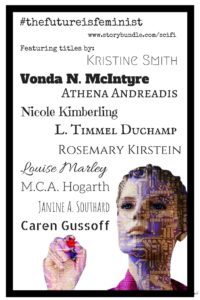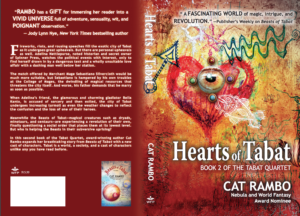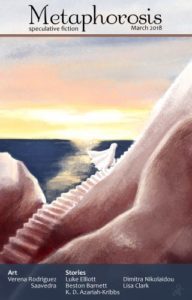Cat Rambo's Blog, page 31
March 27, 2018
Where I’ll be at Norwescon, 2018
 I have a table in the Writers Alley this year and will be there starting Friday morning. Stop by! I will have books for sale as well as the “Writers Just Fucking Write” keychains.
I have a table in the Writers Alley this year and will be there starting Friday morning. Stop by! I will have books for sale as well as the “Writers Just Fucking Write” keychains.
Friday
Literary Techniques for Genre Fiction: Writing Workshop
10:00am – 12:00pm @ Cascade 13
Cat Rambo (M)
Speculative Poetry
2:00pm – 3:00pm @ Cascade 12
Brenda Cooper, Cat Rambo, Alexandra Renwick, Evan J. Peterson
Reading: Cat Rambo
4:30pm – 5:00pm @ Cascade 4
Cat Rambo (M)
Saturday
Kandy Klatch with Cat Rambo
12:30pm – 1:00pm @ Presidential Suite 1360
Cat Rambo (M)
Autograph Session 1
2:00pm – 3:00pm @ Grand 2
Chris Pramas, Galen Dara, Ken Liu, Matthew Wedel, Nicole Lindroos, Alexander James Adams, Brenda Cooper, Cat Rambo, Donna Barr, Echo Chernik, Ethan Siegel, Evan J. Peterson, Greg Bear, Jennifer Brozek, Jeremy Zimmerman, John (J.A.) Pitts, Julie McGalliard, Kay Kenyon, Kent Hamilton, Laura Anne Gilman, Lisa Mantchev, Django Wexler, PJ Manney, Spencer Ellsworth, Dr. Vicki Wedel, Lish McBride, Kurt Cagle
Writer Talk: He Said/She Said/They Said?
5:00pm – 6:00pm @ Cascade 7 & 8
Cat Rambo (M), K. C. Alexander, Fonda Lee, K.G. Anderson
Sunday
What is SFWA (Science Fiction Writers of America)?
11:00am – 12:00pm @ Cascade 5 & 6
Cat Rambo (M), Curtis C. Chen
Social Media for Authors
3:00pm – 4:00pm @ Cascade 11
K.G. Anderson (M), Cat Rambo, K Tempest Bradford, G. Willow Wilson
March 13, 2018
Guest Post: B. Morris Allen is 5×5
Have you ever wondered how your favorite story would sound if written by another author? What is it exactly, that makes writers different? What does each one bring to the story they’re writing, in terms of style, mood, tone, etc? How would the story sound as written by someone else?
That’s what the Reading 5X5 anthology explores – twenty-five SFF writers writing five variants of five stories. I asked five groups of five authors to start from the same basic story brief, but write in their own way. The result is fascinating – five wildly different approaches to each of the five briefs, but each telling, at its core, the same story.
Where did this come from?
In 2013, I read Retrospective: the Best of Gene Wolfe, in which he encourages writers to pick a story by a successful author, rewrite it from scratch, and analyze the differences. I liked the idea, but never got around to actually doing it.
In 2015, I participated in my first Novel-in-a-Day, in which each author writes one chapter of a novel, based on just a few shared facts and plot elements. There are usually multiple versions of each chapter, and it’s always interesting to read another author’s take on ‘your’ chapter.
From those two seeds, Reading 5X5 arose in mid-2017. What if comparing and contrasting different authors’ takes on the same material was the focus of the effort, rather than a bonus? What if it were an anthology, with several groups of authors taking on the same stories?
Between 2013 and 2017, it just happened that I had started an online SFF magazine, Metaphorosis. By the time I’d come up with the anthology idea, we’d been publishing for almost two years. That meant I had a ready-made pool of authors whose work I knew I liked. I sent out a query, which said, essentially – “Here’s a fun idea. Are you interested? And by the way, let’s do it for charity, so please give me your work for free.” I’m happy to say that a lot of people said yes, because that’s just how Metaphorosis authors are.
Around the same time, I’d come up with the Reading 5X5 title, which gave me the size of the anthology. We had so much interest that we signed up alternates, in case someone needed to drop out. In fact, no one did (the one down side being that I didn’t get to step into the gaps myself.)
So, how did it all work out?
I’m extraordinarily pleased. The stories are fascinating to read and to compare. Some groups ended up reasonably similar (in theme, but not in detail), while others were strikingly different. Some authors stuck close to the brief; others (even those who wrote the briefs) veered off in unexpected directions. No matter what, though, the stories in each group are recognizably the same story at their core, while being creatively, inventively different in most other ways.
Not only that, but it was fun to do.The whole endeavour was collaborative. Writers volunteered to write the story briefs, they took on the proofreading, and they participated in promotion. I enjoyed it, and I think the writers did too.
What about the actual book?
From the start, I wanted the anthology to work for two groups – readers (people like my spouse, who just want to read good stories and can’t be bothered with all the trim) and writers (who want to really dig in and see how and why the stories differ, and how they would have handled the brief). True to that goal, we’ve produced two editions of the book.
The Readers’ edition – just 25 great stories from five story seeds.
The Writers’ edition – all 25 stories, plus two extras, plus the original story briefs, plus extensive author’s notes for each story and by the writer of each brief. My recommendation is that writers who really want to make the most of the book start with the briefs, and write their own story from one or more of them before reading the anthology. See what choices you and the other authors made, and how they worked out differently. To help that along, set up a website where authors can post their stories and compare with an even larger group: x1.reading5X5.com
You can probably tell I’m rooting for the Writers’ edition. The stories are great in themselves, and I hope a lot of people will enjoy them. But the Writers’ edition is where the real fun is, in my mind. It’s not only interesting in itself – seeing the genesis and the thought process of each author – but it’s a ready-made writing exercise that authors can try on their own, with their critique groups, or, via the website, with strangers. The best ways to develop as a writer are to read and to write. Reading 5X5 offers both. Come check it out!
And did I mention it’s for charity? All proceeds go to the Clayton Memorial Medical Fund, providing for critical medical expenses of SFF writers in the Pacific Northwest (where Metaphorosis is based).
#SFWAPRO
March 8, 2018
In Celebration of International Women’s Day: Feminist Futures Storybundle
 I’m so pleased that my Feminist Futures Storybundle came out in time for International Women’s Day! This bundle celebrates some of the best science fiction being written by women today, gathering a wide range of outlooks and possibilities, including an anthology that gives you a smorgasbord of other authors you may enjoy!
I’m so pleased that my Feminist Futures Storybundle came out in time for International Women’s Day! This bundle celebrates some of the best science fiction being written by women today, gathering a wide range of outlooks and possibilities, including an anthology that gives you a smorgasbord of other authors you may enjoy!
This is my favorite bundle so far, although I’m already assembling one in my head for next year that will be even better and more diverse. Why? Because I used to work in the tech industry, and there I saw how diversity could enhance a team and expand its skillset. Women understand that marketing to women is something other than coming up with a lady-version of a potato chip designed not to crunch or a pink pen sized for our dainty hands. Diversity means more perspectives, and this applies to science fiction as well. I am more pleased with this bundle than any I’ve curated so far.
In her feminist literary theory classic How to Suppress Women’s Writing, science fiction author Joanna Russ talked about the forces working against the works of women (and minority) writers. A counter to that is making a point of reading and celebrating such work, and for me this bundle is part of that personal effort, introducing you to some of my favorites. Ironically enough this bundle idea started with a particular book, Native Tongue by Suzette Haden Elgin, that fell through at the last minute sadly — but that’s all the more reason to do this theme again next year for Women’s History month again. 
March 6, 2018
Up to One’s Hips: Thoughts on Wading Through the Slushpile
 I just finished the first pass on the slushpile for If This Goes On. The anthology is intended to be half solicited manuscripts; half from the open call, and I’m happy to say that I don’t think it’s going to be hard to pull that together. I’ve got five or six definites on my list right now, and I’m setting them aside. I did read through every story except for a handful of less-than-serious ones; thank you to the slushreaders and publisher Colin Coyle for winnowing those out.
I just finished the first pass on the slushpile for If This Goes On. The anthology is intended to be half solicited manuscripts; half from the open call, and I’m happy to say that I don’t think it’s going to be hard to pull that together. I’ve got five or six definites on my list right now, and I’m setting them aside. I did read through every story except for a handful of less-than-serious ones; thank you to the slushreaders and publisher Colin Coyle for winnowing those out.
If I can, I’ll take one more pass through the first third or so of the slushpile, when I was reading and not knowing how strong some of the submissions would be. I suspect at least a third of those can be winnowed. Then I’ll ask the publisher to send out that round of rejections.
By then I am hoping I’ll have narrowed things down to a few dozen stories. These manuscripts have officially made it to the final round. At this point I’ll be looking at some things that include:
Is this a common theme or something unusual? A few commonalities have emerged and I will probably only have one underwater people story, one abortions-are-illegal story, one from-a-child’s-POV story, and one post-apocalyptic landscape story, which may or may not be one of the several that featured a particular dietary item.
How much bang for the buck does it yield in terms of editorial work? If it’ll be amazeballpants (common editorial jargon), then I’m willing to put more time into it. Along the same lines, I’ve got one serviceable story that would only take a little work to deepen its emotional impact. It’s also a strong contender.
What’s the tone? I’ve got lots of gritty, desperate stuff and some humor in there to leaven the mix is necessary. At the same time I don’t want things that will seem incongruous next to each other.
What did the slushreader(s) think? Unfathomable as it may seem, I have been known to be wrong. If I was meh about a story but someone else raved, I’ll certainly go back and take another look.
Then will come the final passes, where I’ll be reluctantly saying goodbye to some stories for reasons that might include:
They don’t fit the overall theme as strongly as the others.
They don’t play off other stories, or else are too similar to another piece.
They will take a lot of editing, but the amount of work required by other pieces with similar strengths/themes is significantly less.
I hope that the slushreaders have learned something from all of this, including a better sense of what submitters may or may not want to avoid, and how varied the slush pile can be. With a few of them we’ve done some talking about stories, but not all. For most slushreaders, I would suggest if you’re passing up more than half the stories, you are not being harsh enough, but if it’s only one in ten, you may be leaving out some stuff the editor will want to see, unless your tastes are perfectly aligned.
Coming Up Next For the Rambo Academy
Yay! So much new stuff for the Rambo Academy for Wayward Writers. Let’s start with this shiny thing: a calender! That you can click on and see events like classes, upcoming readings, and convention appearances! So awesome!!
So what’s coming up in the next few months? Lots of great stuff.
Saturday, March 10. Detail and Image Workshop with Rachel Swirsky (NEW CLASS)
Sunday, March 11. Let’s Play Writing Games (NEW CLASS)
Saturday, March 24 Writing Your Way Into Your Novel (Cat Rambo)
Sunday, March 25, Moving from Idea to Finished Draft (Cat Rambo)
Saturday, April 7 Flash Fiction Workshop (Cat Rambo)
Sunday, April 8, Short Story Openings (Scott Andrews; NEW CLASS)
Saturday, April 14 Writing Steampunk and Weird Western (Cat Rambo)
Saturday, May 12 How to Write Better Food (Cassandra Khaw)
Sunday, May 13 Ideas Are Everywhere with Rachel Swirsky
Saturday, May 26 How to Write Funny (Howard Tayler; NEW CLASS)
Sunday, May 27 Cussin’ in Secondary World with Fran Wilde
Saturday, June 2 Journaling for Creativity workshop (description to come) (Fran Wilde; NEW CLASS).
Sunday, June 3 The Power of Words: Linguistics for Writers with Juliette Wade
Saturday, June 9 Blood Guts and Gore (description to come) (Cassandra Khaw)
Sunday, June 10 Fire When Ready: Writing Flintlock Fantasy (jango Wexler; NEW CLASS)
Sunday, June 17 Breaking the Rules
Saturday, June 30 Writing Speculative Poetry (Rachel Swirsky)
July 1 Poetic Techniques for Prose Writers (description to come) (Rachel Swirsky; NEW CLASS)
Saturday, July 7 Creating an Online Presence for Writers (Cat Rambo)
Sunday, July 8 Handling Social Media for Writers (Cat Rambo; NEW CLASS)
Sunday, July 22 Detail and Image (Rachel Swirsky)
Saturday, July 28 Anthropomorphic Agenda: Writing Furry Fiction (Kyell Gold; NEW CLASS)
I have created faculty pages! Here’s the overall page, plus I’m starting to fill in individual ones for instructors:
Scott Andrews
Jennifer Brozek
Ann Leckie
Cat Rambo
Rachel Swirsky
Howard Tayler
Juliette Wade
Django Wexler
Fran Wilde
February 20, 2018
Guest Post: Dan Koboldt on Magic Versus Technology in SF/F
 It’s always bothered me that fantasy and science fiction get lumped together into a single category. The two genres seem very different, at least on the surface. Fantasy usually features some kind of magic as a core speculative element. It often takes place in a secondary world at a pre-industrial state of technology. Science fiction, in contrast, usually takes us to the future in which some as-yet-nonexistent technology underlies the plot. Granted, there’s a huge overlap between fantasy and science fiction fandoms. Maybe that means we live for escapism, whether to a fantasy world or outer space.
It’s always bothered me that fantasy and science fiction get lumped together into a single category. The two genres seem very different, at least on the surface. Fantasy usually features some kind of magic as a core speculative element. It often takes place in a secondary world at a pre-industrial state of technology. Science fiction, in contrast, usually takes us to the future in which some as-yet-nonexistent technology underlies the plot. Granted, there’s a huge overlap between fantasy and science fiction fandoms. Maybe that means we live for escapism, whether to a fantasy world or outer space.
The Crossover Genre: Science Fantasy
It’s rare but wonderful when we get both sci-fi and fantasy elements in the same story (a genre sometimes called science fantasy). Dune is the first example that comes to mind. Disclaimer: Dune always comes to mind when I’m thinking of science fiction, because I love it so much. Most of the series is sci-fi: space travel, drones, laser rifles, and a sprawling galactic empire. But there are other elements that I’d call magic: the practices of the reverend mothers, for example, and the prescient powers achieved with a spice overdose. When the story goes out into the deep desert with the great sandworms, it feels like a fantasy to me.
I could also argue that the original Star Wars also blends the SF/F genres. The talking droids, epic space battles, and planet-blasting Death Star make it mostly a science fiction story, but there’s also magic that plays a pretty central role to the story. Like all great magic systems, this one is accessible to only a select few, requires considerable training, and has certain limitations. And it plays a key role in the central conflict. Obviously, I’m talking about the Force. It’s not just a magic system, but practically a religion among its practitioners.
Technology Versus Magic
The interplay between magic and technology in Star Wars is fascinating. When it comes to technology, the Empire has almost every advantage. Bigger, better ships. Armored combat walkers. And a planet-destroying space station, albeit briefly. The Rebellion’s scrappy fighters win unlikely victories against these overwhelming forces. They did so often with the aid of that mystic religion. The Force, in other words, can level the playing field.
Magic and technology as speculative elements actually have quite a bit in common. Given a new capability – either arcane or technological in nature – we tend to apply it to similar problems. Both serve as weapons (curses and lasers) or in defense from attacks (wards and deflector shields). Healing is another popular application, whether that’s with a medical tricorder or a fistful of athelas. The same goes for teleportation, construction, destruction, and many other forms of speculative wish-fulfillment.
Which Element Matters More?
Given their similarities, one has to wonder: in a world where both magic and advanced technologies exist, which side has the upper hand? It is tempting to say technology matters more, because a technical advantage is both practical and constant. If you have guns and they have bows, you’re likely to be victorious. If the technology gap is wide enough, Clarke’s third law might be applied: any sufficiently advanced technology is indistinguishable from magic.
Even so, I can’t help but notice that the scrappy underdogs facing a huge technology deficit often emerge victorious if they have magic on their side. In both Dune and Star Wars, the underdogs manage to topple powerful emperors. And in both cases, they do so with considerable help from arcane sources: the Jedi’s mastery of The Force, and the witch-like powers of Bene Gesserit. In a conflict between two mismatched sides, magic can be a powerful equalizer.
About the Author
Dan Koboldt (website) is a genetics researcher and fantasy/science fiction author from the Midwest. He is the author of the Gateway to Alissia series (Harper Voyager) about a Las Vegas magician who infiltrates a medieval world. He is currently editing Putting the Science in Fiction, (Writers Digest), a reference for writers slated for release in Fall 2018.
By day, Dan is a genetics researcher at a major children’s hospital. He and his colleagues use next-generation DNA sequencing technologies to uncover the genetic basis of pediatric diseases. He has co-authored more than 70 publications in Nature, Science, The New England Journal of Medicine, and other scientific journals.
Dan is also an avid hunter and outdoorsman. Every fall, he disappears into the woods to pursue whitetail deer with bow and arrow. He lives with his wife and three children in Ohio, where the deer take their revenge by eating all of the plants in his backyard. Follow him on Twitter as @DanKoboldt.
February 16, 2018
Two Seattle Memorials to Ursula K. Le Guin
We’ve got two coming up in the next couple of weeks and I’ll be at both.
Tuesday, February 20, 2018
7:00 PM
$10 at the door
$8 for Folio Members, SFWA Members, and Town Hall Members
Complimentary wine reception to follow
Folio Forum
A Tribute to Ursula Le Guin
Noted local authors and fans honor the great writer.
Plus a recording of Le Guin, reading her famous story
Folio: The Seattle Athenaeum
314 Marion Street, Downtown Seattle
Parking tips and map: www.folioseattle.org
Many deeply mourn and greatly esteem Ursula Le Guin, the famous, and famously prolific, Portland-based writer of science fiction, fantasy, and many other works. To honor Le Guin, who died last month at the age of 88, Folio is hosting a gathering of authors and readers moved by the works of this remarkable author. Le Guin wrote poetry, children’s books, essays, and short stories. Her science fiction works attracted an immense readership and she brought literary depth and a tough-minded feminist sensibility to science fiction and fantasy.
A highlight of the evening will be hearing Le Guin on a recording where she reads from one of her most famous stories, “The ones who walk away from Omelos.” Those sharing memories and tributes include Cat Rambo, president of the Science Fiction and Fantasy Writers of America (SFWA) and critic Edward Wolcher of Town Hall Seattle.
That weekend:
Sunday, February 25
7:00 PM (please support our venue by buying food and drink!)
$free
Celebration of the Life and Work of Ursula K. Le Guin
Blue Moon Tavern, 712 NE 45th St, Seattle, Washington 98105
Please join us for a reading to commemorate the words and worlds of Ursula K. Le Guin (1929–2018). One of the most beloved writers of our time, Ursula K. Le Guin inspired generations of readers with her science fiction and fantasy literature, from Earthsea to Hain-Davenant. Let’s keep her spirit with us always.
Our evening celebration will consist of readings of Le Guin’s work by Eileen Gunn, Nisi Shawl, Cat Rambo, and you. Please bring up to five minutes of your favorite writing by Ursula K. Le Guin to share during open mic. This event is *free* and open to the public.
There will be a sign-up at the venue for open-mic readers. (Slots will be limited, readers selected in order of sign-ups.)
#sfwapro
February 9, 2018
More on The First Chapters Project
If you don’t know what the SFWA First Chapters project is, it’s an effort to collect first chapters from F&SF novels published throughout the year in a single compendium. This should help with reading for awards in that you have a chance to sample books before figuring out what you want to read in its entirety. For writers, it should be a chance to get that first chapter in front of reader eyes in order to convince them they want to keep going. In 2018 the focus is getting indie writers up and running with the program, but if you’re a small publisher interested in participating, let me know.
As part of that project, I asked the group working on it to make sure that people uploading first chapters can keyword their work so, for example, if you just wanted to see chapters eligible for a specific award, like the Sideways, Prometheus, or Andre Norton Awards.
Here’s the list I just gave them. Any other awards you’d add? I didn’t include ones that are restricted by geographical area like the Aurora or Endeavour Awards.
List of all keywords:
Alternative history novel
Anthropomorphic novel
Fantasy novel
First novel
Game-related novel
Horror novel
Libertarian
Media tie-in novel
MG novel
Military SF novel
PKD eligible
SF novel
Urban fantasy novel
YA novel
Bram Stoker Award
http://www.horror.org/awards/stokers.htm#about
Keywords: First novel, horror novel, YA novel
————————————————————
British Fantasy Awards
http://www.britishfantasysociety.org/british-fantasy-awards/
Keywords: fantasy novel, horror novel
————————————————————
British Science Fiction Awards
https://www.bsfa.co.uk/
Keywords: SF novel
————————————————————
Compton Crook Award
http://www.bsfs.org/CCA/bsfsccnu2014.htm
Keywords: First novel
————————————————————
David Gemmell Awards for Fantasy
http://www.gemmellawards.com/award-voting-2017/
Keywords: fantasy novel, first novel
————————————————————
Dragon Awards
http://awards.dragoncon.org/
Keywords: SF novel, fantasy novel, YA novel, MG novel, military SF novel, alternative history novel, media tie-in novel, horror novel
————————————————————
Ennie Awards
http://www.ennie-awards.com/blog/
Keywords: game-related novel
————————————————————
Hugo Awards
http://www.thehugoawards.org/
Keywords: SF novel, fantasy novel
————————————————————
Keystroke Medium Awards
http://www.keystrokemedium.com/ksm-awards.html
Keywords: SF novel, military SF novel, post-apocalyptic novel, fantasy novel, epic fantasy novel, urban fantasy novel, horror novel
————————————————————
Locus Awards
https://locusmag.com/
Keywords: SF novel, fantasy novel, first novel, YA novel
————————————————————
Nebula Awards/Norton
http://nebulas.sfwa.org
Keywords: Fantasy novel, SF novel, YA novel, MG novel
————————————————————
Philip K. Dick Award
http://www.philipkdickaward.org/
Keywords: PKD eligible (appeared in paperback rather than HB first)
————————————————————
Prometheus Award
http://www.lfs.org/
Keywords: libertarian novel
————————————————————
Sideways Awards
http://www.uchronia.net/sidewise/
Keywords: alternative history novel
————————————————————
Ursa Major Awards
http://www.ursamajorawards.org/
Keywords: anthropomorphic novel
————————————————————
World Fantasy Awards
http://www.worldfantasy.org/awards/
Keywords: fantasy novel
January 18, 2018
For Reviewers/Book Bloggers: ARCs and Review Copies for 2018 Projects
 I have enough coming out in 2018 that some of the different campaigns are colliding a bit. Some are self-pubbed projects, others are with presses but I’m helping with the marketing where I can.
I have enough coming out in 2018 that some of the different campaigns are colliding a bit. Some are self-pubbed projects, others are with presses but I’m helping with the marketing where I can.
If you’re a reviewer (including Amazon, GoodReads, NetGalley, and other book sites) or a book blogger and would like a review copy or copies of any of the following, please drop me a line with your contact info, where your reviews appear, title(s), what format you prefer, and where to send it. Be aware that requests for physical copies may take longer and that I have a limited number available, so I may not be able to fill them all.
Here’s the list of what’s coming in 2018 in alphabetical order:
Creating an Online Presence for Writers, 3rd edition. (Plunkett Press). Nonfiction, covers how to create and maintain an online presence in order to build a writerly brand and sell books. Appearing in July.
Godfall and Other Stories by Sandra Odell is a collection from Hydra House that I’m editing. These stories are both fantasy and science fiction, and are usually on the darker side, with occasional flashes of humor. They’re wrenchingly strong at times, and I’m very excited to be one of the people making this book real. Appearing in mid-April.
Hearts of Tabat (WordFire Press). Novel, secondary world fantasy. While this is the second book of the Tabat Quartet, you do not need to have read Beasts of Tabat to understand it. Appearing in mid-April.
If This Goes On (Parvus Press) is an anthology of political science fiction focusing on what the world will look like a generation from now. Open for submissions through the end of March, the anthology will appear in conjunction with the 2018 elections.
Moving From Idea to Finished Draft. (Plunkett Press) Nonfiction writing book based on this class, which contains stories illustrating each section. Appearing in late February.
Tales of Tabat (Plunkett Press) is a collection of all the short stories and novelettes set in Tabat, including several pieces original to the collection. I’ve got that tentatively slated for September.
The World Made Flash. Plunkett Press. A collection of all my flash pieces along with several essays about writing very short fiction should appear in July.
I am also re-releasing my first solo fantasy collection, Eyes Like Sky and Coal and Moonlight (February) in print form, and a new version of steampunk collection Altered America with the horrible typos removed in both electronic and print form.
If you’re promoting your own book this year and are interested in doing a guest post here, let me know! Here’s my guidelines for guest posts.
January 8, 2018
What I’m Telling the Slush Readers for If This Goes On
 A week or so ago we had the orientation session for the slush readers. I gathered them by posting announcements in my newsletter and other social media, but I also tried to reach out to a range of people in order to ask for recommendations in order to ensure I had a diverse pool. We ended up with over a dozen slushreaders, and one of the things I want all of them to take away from the experience is better understanding of stories and how to sort through things.
A week or so ago we had the orientation session for the slush readers. I gathered them by posting announcements in my newsletter and other social media, but I also tried to reach out to a range of people in order to ask for recommendations in order to ensure I had a diverse pool. We ended up with over a dozen slushreaders, and one of the things I want all of them to take away from the experience is better understanding of stories and how to sort through things.
We video-recorded the session, and the publisher went over the mechanics of the slush system in that as well. Parvus Press has mentioned recently that I asked to have the slush read blind, which to me seems like a better approach. Studies have shown that perception of the attached name can change the way someone reacts to a scholarly paper, and I’m reasonably sure similar things happen when reading fiction.
One of the things I’ve stressed is that typos and grammatical errors aren’t a dealbreaker – we can fix those. A compelling story with some issues like that is something I want to see. But the world’s most immaculately formatted story won’t do much for me unless there’s a good story attached, by which I mean a story that entertains while at the same informs or engages or makes you think or hopefully some combination of all of that. Look for the stories that startle and amaze you, I told them. Or really piss you off, I added, because sometimes that’s the sign of a good story.
If the story is from a viewpoint radically different than their own, I’d like them to make sure some other eyes check it out. (Nonetheless I’m going to be a pain in the rear and read everything, partly because I want to be able to talk to the slushreaders about stuff as it comes up.)
I emphasized a policy that I have borrowed from John Joseph Adams, who has edited a kerjillion anthologies, and asked people not to talk about the slushreading experience in anything but vague and enthusiastic terms. I know writers will be watching those utterances and often taking stuff to heart that was not intended for them. In my early years, I had the odd experience of having an IGMS slushreader blog about my story submission in mocking terms. This probably would have been more discouraging if the actual editor hadn’t just bought the story, but I will always remember reading through their account of the slushreading party and the lines about all of them laughing about hitting a story written from an elephant’s POV. The vividness of that moment is not something I really want the slushreaders inflicting on other writers.
We closed up by talking a little about how to stay un-depressed in the light of what may well turn out to be a whole bunch of grim stories. It’s okay to step away from the keyboard sometimes, and we have enough slushreaders that plenty of eyes will be looking at the stories.




